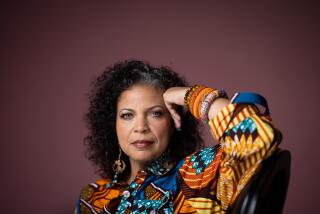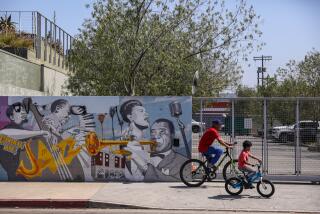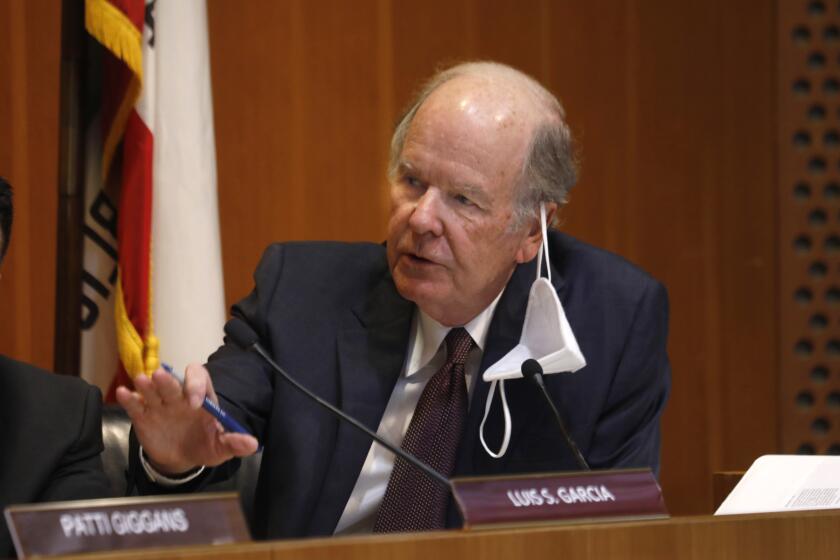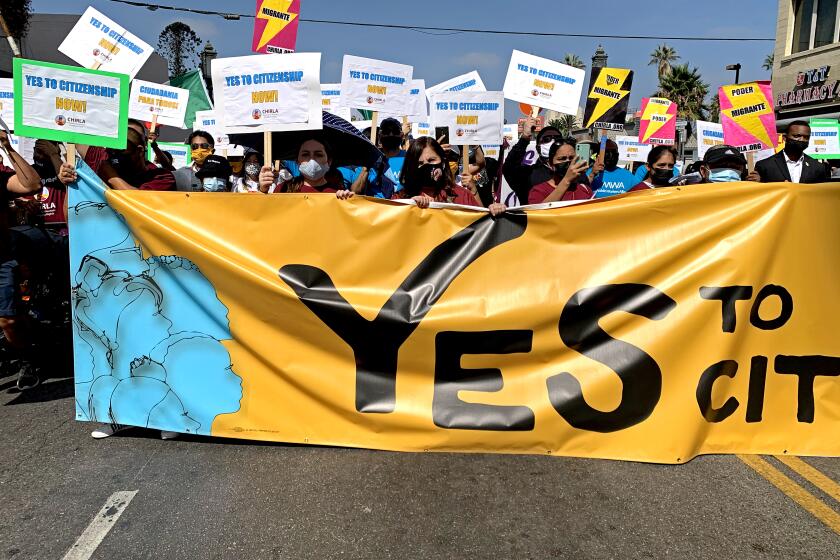Activists Silent on Beating
- Share via
As is often the case, Najee Ali was the first speaker and most familiar face Tuesday at the demonstration outside Inglewood City Hall.
He popped a few veins over the videotaped altercation between cops and 16-year-old Donovan Jackson, stepped aside for a while, and then returned to tell everyone that New York Reverend Al Sharpton was on his way to town for a march and rally.
This announcement was met with approval from the 100 or so demonstrators, but for me it was a sorry sign. L.A. is a major league city. As I wrote Wednesday, we shouldn’t have to count on Al Sharpton, of all people, to lead any of us anywhere.
So the next day, I met with the ubiquitous Ali, of Project Islamic Hope, to ask what gives.
“We’re in a crisis in black leadership in Los Angeles,” he said without hesitation. “They’re more concerned with making money, and a lot of the time, our so-called black leaders are poverty pimps.”
Ali had borrowed the phrase from former Los Angeles Mayor Dick Riordan. But what exactly did he mean by it? I asked.
“There’s no real concern for the welfare of the people. There’s not a way for them to profit off of this or they’d be involved. I haven’t been contacted by any other black leader or group except for Rev. Al Sharpton.”
He did add that the Rev. Jesse Jackson, another outsider, called Donovan Jackson’s family.
“You juxtapose this with Bernard Parks,” Ali said, referring to the recent ouster of the LAPD police chief, “and every major black leader busted the barricades to be heard. Now we’ve got a child beaten on videotape, and no one’s moved an inch.”
Speaking of Parks, the guy lives five minutes from Inglewood and wants to enter politics, and he’s got nothing to say?
Ali, 38, ends up being L.A.’s face of black leadership “by default,” to use his own words.
“In New York, I’d be one of a handful. But the elders here are not grooming young leaders, and all the black elected officials are old people ... who care more about driving their Mercedes and having a house in Baldwin Hills or Ladera.”
Ali, a former gangster with the Crips, and an ex-con who got religion in prison, lives in Baldwin Hills himself and Project Islamic Hope is funded in part with grants. So I asked what distinguishes him from the so-called poverty pimps.
“I fight for social justice,” he said.
Among those Ali criticized by name were L.A. County Supervisor Yvonne Brathwaite Burke and Congresswoman Maxine Waters, both of whom represent Inglewood.
I called their offices for a response.
Burke’s secretary, who had been out of the office for several days, said that if Burke hadn’t said anything, it’s probably because she wasn’t asked.
Sometimes my job is just too easy.
The secretary later called back to say that in fact, Burke “stepped up to the plate” with a motion to investigate the incident.
“Stepped up to the plate” and whiffed, if you ask me. I’m being generous in guessing it took Burke roughly five minutes to assemble her motion, which misstates the facts and adds nothing to the discussion.
Waters was on the phone to me from Washington, D.C., about two minutes after I called her office, and she was not happy.
She refused to criticize Ali, but said that in addition to working on homeland security and helping wage the fight against corporate crime, she’s been on national television and radio speaking out about the Inglewood incident.
She said she’s also been “in constant communication” with Inglewood Mayor Roosevelt Dorn and the lawyer for Jackson’s father, and she sent U.S. Atty. Gen. John Ashcroft a letter calling for an investigation that has now begun.
“I think I’m doing enough, don’t you?” she asked.
I felt as though I’d stepped into the middle of a feud between Ali and Waters, so I called longtime activist and author Earl Ofari Hutchinson to referee.
“I see merit on both sides,” Hutchinson said. Ali is right about a vacuum in black leadership, he went on, but Waters shouldn’t be lumped in with the do-nothings.
So who should be? The list is long, said Hutchinson.
The NAACP, church leaders, the Urban League, the Southern Christian Leadership Conference, black professional groups. When black leaders do speak out in L.A., Hutchinson said, it’s often because Ali is raising a ruckus on the street, forcing them to.
L.A. doesn’t need a Sharpton or any other outsider who’s going to vanish “when the cameras are gone,” Hutchinson said. It needs more local folks with courage and conviction.
There was only one person left to call--KABC radio talk show host Larry Elder.
“There is a crisis of black leadership,” agreed Elder, a black libertarian perpetually at odds with L.A.’s black political class, but it’s got nothing to do with “yelling and screaming” when a 16-year-old gets punched by a cop who later says the kid grabbed him where it hurts.
“It’s about the appalling performance of our inner-city public schools, where three out of four kids can’t read, write and compute at grade-level. But the Democratic Party and Maxine Waters and all these people are in bed with the teachers unions and resist every sort of change, including vouchers.”
“Where are they on black-on-black crime?” Elder asked. “Murder has gone up three consecutive years in this city, including in Maxine Waters’ district.... A quarter of young black men have criminal records, 70% of black children are born out of wedlock.... Where are black leaders on that stuff?”
Talk about grabbing people where it hurts.
*
Steve Lopez writes Sunday, Wednesday and Friday. Reach him at steve.lopez@latimes.com.
More to Read
Sign up for Essential California
The most important California stories and recommendations in your inbox every morning.
You may occasionally receive promotional content from the Los Angeles Times.














